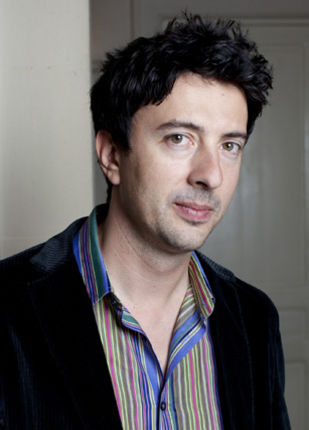Nikolai Grozni: The Whispers of Music Lost

Nikolai Grozni began playing piano when he was four and won his first prize as a professional pianist when he was only ten. Born in Bulgaria, he studied writing in the United States, where has has already published an essay inspired by the four years he spent in a Buddhist monestary in India. He currently lives with his family in the south of France. Wunderkind is his first novel to be translated into French.
Les éditions Christian Bourgois publieront prochainement un recueil en français des textes écrits à l'occasion des assises du roman.
“Only the words break the silence, all other sounds have ceased,” writes Beckett in his Texts for Nothing. Or does he sing it? If words were the only sounds, then a sentence would be the only melody.
We might never understand which came first—the words or the melody. Perhaps the first humans knew how to sing long before they knew how to talk. In this Dionysian vision of antiquity, all mortals were originally musicians. Music was the only thing that mattered. People understood each other by inventing mimetic melodies and singing together in tune. They appeared, loved, suffered, worshipped the gods and died like opera singers on stage. The libretto came much later, as an afterthought, or as a way to enhance and articulate the melody. The meaning came at the very end, after a short eternity in which all the words had been but leitmotifs and tongue-twisting ostinatos embellishing our hymns of joy and sorrow. Suddenly, words acquired monumental importance. Words were no longer pure sounds. They became tools, vehicles, garments, houses, firewood and nourishment. Then they became weapons. Even a single word had the power to kill or save a life. Words commanded soldiers, burned cities and proscribed laws. Somehow we drifted away from the primordial melody and arrived in a ghostly world where the string of whispers in our heads followed a single, unwavering path—the path of logic. The very existence of logic—this supposedly great achievement of the human mind—is predicated on the belief that words are inherently meaningful, important, and indispensable for thinking. Needless to say, this remains just a belief, albeit a very persistent one. If we try to even briefly analyze the origin of thoughts, we very quickly enter the realm of mysticism. What is there before a thought is a thought? Where do before-thoughts come from? Whose voice speaks them? Who hears them? And, more pertinently, can words and thoughts ever satisfy the yearning that produces them in the first place? In other words, can thoughts and names ever be something other than a melody, a chromatic progression, a meandering cadence or a basso ostinato in the evolving symphony of our lives? Nietzsche, a self-professed disciple of Dionysus, bemoaned the unquestioning devotion to logic and rationality that defines the post-Dionysian world. In his essay The Problem With Socrates, Nietzsche calls Socrates the most brilliant of self-deceivers. Socrates, with his “atrophied logical faculty” succeeded in tricking himself into believing that he’d vanquished his instincts with words, with knotted dialectical attacks and double-bladed syllogisms. Socrates declared that rationality is a savior. For that, Nietzsche saw him as fundamentally anti-Greek and decadent. Decadent, because the deification of reason is the death of the Dionysian, of mysticism and, finally, of music. Still, there are times when a simple melody can lift the burden of reason and dialectical posturing and transport us to the world of our primordial instincts, where we’re surrounded by the manic cries of the maenads and enchanted by the irrational power of Bromius’ intoxicating drink and the ecstasy of his illusory realm. Perhaps we only imagine that we understand. We imagine that there is a consciousness that understands. And the whole time—our whole life—we’re actually just listening to music.
Pour citer cette ressource :
Nikolai Grozni, Nikolai Grozni: The Whispers of Music Lost, La Clé des Langues [en ligne], Lyon, ENS de LYON/DGESCO (ISSN 2107-7029), septembre 2014. Consulté le 31/12/2025. URL: https://cle.ens-lyon.fr/anglais/arts/musique/nikolai-grozni-the-whispers-of-music-lost



 Activer le mode zen
Activer le mode zen

